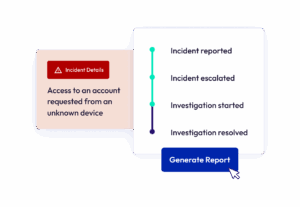
Cyber security incident reporting is a critical tool in an organisation’s cyber defence armoury and a key component of a layered security strategy. It provides the structure needed to identify, manage and contain cyber incidents before they escalate into major security breaches. But what exactly is cyber security incident reporting, and why is it so important?
According to UK government research, four in ten businesses (39%) and a quarter of charities (26%) report having cyber security breaches or attacks in 2025. Like previous years, this is higher among medium businesses (65%), large businesses (64%) and high-income charities (51%).
Early detection is vital. Knowing when a cyber incident occurs gives organisations valuable time to respond effectively and prevent further damage. As incidents escalate rapidly, the ability to capture accurate event data becomes an essential part of stopping an attack in its tracks.
What Is Cyber Security Incident Reporting?
Incident reporting is already widely used across organisations, particularly for health and safety events. Cyber security incident reporting follows a similar principle, enabling employees to report suspicious or harmful cyber events such as phishing emails, malware downloads or unauthorised access attempts.
The process captures key details about the incident at the time it occurs, or shortly afterwards. This information is then assessed to determine the severity and risk level of the incident, allowing it to be escalated appropriately. An incident response team can then take swift action to contain the threat and minimise impact.
An effective incident reporting tool works hand in hand with an incident response plan. Together, they ensure a structured, logical and timely response to cyber security incidents, helping to reduce business disruption and financial loss.
The Importance of Escalating Cyber Incidents
Even seemingly minor cyber incidents can quickly escalate into major security events. Ransomware attacks are a prime example, often beginning with a single click on a malicious phishing link.
Research from Microsoft shows that a ransomware attack can infiltrate an enterprise network within four hours, with some attacks crippling operations in under 45 minutes. Rapid escalation and containment are therefore essential.
Once an incident is reported, an automated cyber security incident reporting tool initiates triage through three core stages:
Record: Structured forms capture consistent and accurate incident details. Guided questions remove ambiguity and help determine the severity of the event.
Remediate: The incident is prioritised and managed in line with the organisation’s incident response policy. This stage also supports regulatory compliance by generating audit-ready reports for governance and regulatory bodies.
Report: Dashboards and analytics highlight trends and recurring threats, providing insight into the organisation’s cyber risk landscape. This intelligence helps refine incident response plans and improve long-term resilience.
The data collected also feeds directly into more targeted and effective security awareness training, strengthening defences against future attacks.
Four Reasons Every Organisation Needs an Incident Response Plan
A cyber security incident reporting tool is most effective when aligned with a clearly defined incident response plan. This plan outlines how to identify a breach, contain the threat, protect sensitive data and recover operations while maintaining regulatory compliance.
Helps Resolve Incidents Faster
An incident response plan provides clear, step-by-step guidance during a cyber incident. This ensures a consistent, best-practice approach that minimises damage and reduces recovery time.
Mitigates Major Incidents
Major cyber incidents can be costly and damaging to reputation and morale. A pre-prepared response plan ensures swift, confident action, even under pressure, reducing the likelihood of prolonged disruption.
Improves Stakeholder Communication
Effective response plans include communication strategies for key stakeholders. Research shows that keeping stakeholders informed throughout incident response and recovery significantly improves outcomes.
Supports Continuous Improvement
Using a “lessons learned” approach allows organisations to analyse incidents and strengthen defences. Incident reporting data plays a vital role in refining processes and preventing repeat attacks.
Learn More About MetaCompliance Solutions
Effective cyber security incident reporting is only one part of building a strong human defence layer against cyber threats. MetaCompliance provides a comprehensive suite of solutions designed to reduce human risk, improve incident response, and enhance organisational cyber resilience.
Our Human Risk Management Platform encompasses:
- Automated Security Awareness
- Advanced Phishing Simulations
- Risk Intelligence & Analytics
- Compliance Management
To see how these solutions can strengthen your organisation’s ability to detect, report and respond to cyber incidents, contact us today to book a demo.
FAQs about Cyber Security Incident Reporting
What is cyber security incident reporting?
It is the process of recording, assessing and escalating cyber security events to ensure a timely and effective response.
Why is incident reporting important?
It enables early detection, faster containment and reduced impact of cyber attacks.
What types of incidents should be reported?
Phishing emails, malware infections, suspicious links, data breaches and unauthorised access attempts.
How quickly should incidents be reported?
Immediately or as soon as possible after detection to prevent escalation.
Does incident reporting help with compliance?
Yes, it provides documented evidence for audits and regulatory requirements.
Can training improve incident reporting?
Security awareness training significantly increases employee confidence and reporting accuracy.